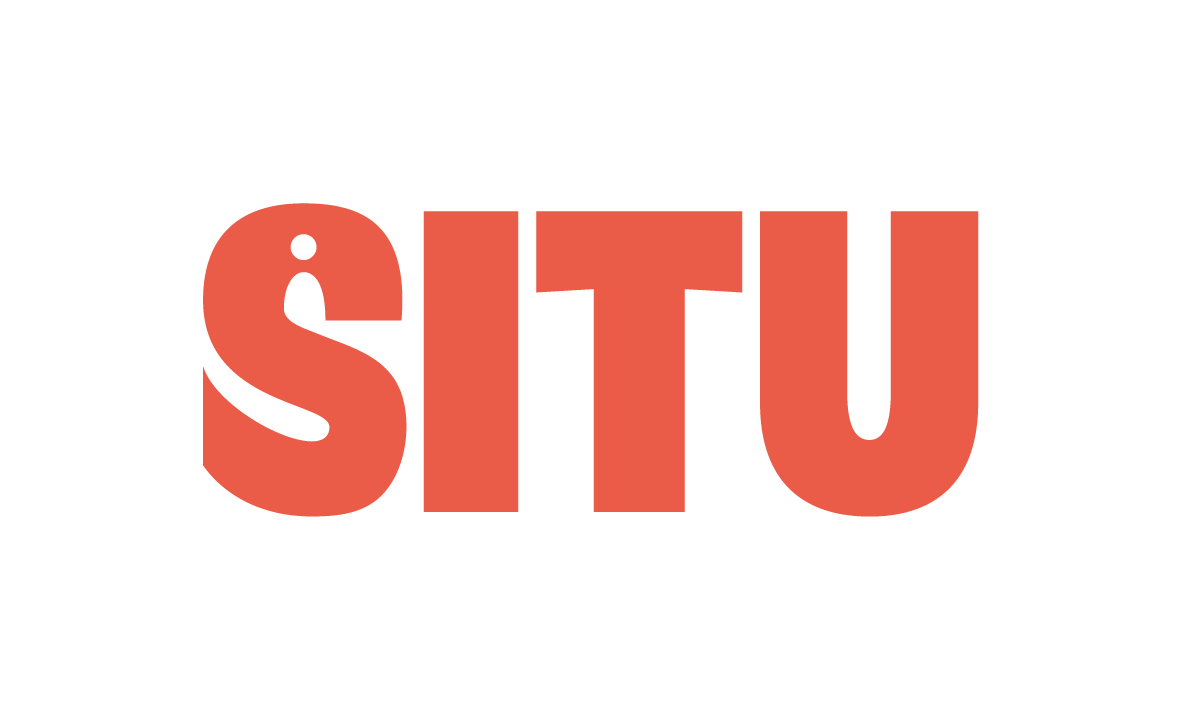Here at Situ, we’re fortunate to enjoy many networking events and opportunities to make connections – we love the chance to meet with our friends and colleagues across the industry. We’re aware though that sometimes we might need a little support to get the most out of these events – even seasoned networkers sometimes need a refresher!
We thought we’d share below some of the practical skills and tips we learned from our recent consultant-led training event – you’re welcome!
- What is networking and how does it benefit us?
- How to be a success at networking
- Active listening
- Elevator pitch
- Feelings associated with networking and how they can be managed
- Small talk is a big help
- Don’t be a lonely lemon
- Awkward situations
- Post-networking things to remember
- Online networking
- Conclusion
What is networking and how does it benefit us?
Networking is all about building your professional and social community for mutual help and support. This is done through communication in various settings such as meetings, conferences, exhibitions, seminars, dedicated networking events, presentations, pitches, as well as online environments (which we’ll cover in more detail later on).
Numerous benefits result from networking. For an individual, it allows you to gain insights into competitors, clients, and industry trends. You can also raise your profile, demonstrate your knowledge and expertise, and ultimately further your career. Connections you meet can have untold benefits on your professional development.
A further consideration is the benefits your company can reap from your networking. By sending a representative to events, a company can raise its awareness, gain a better understanding of how the business is perceived by outsiders, open doors to new business opportunities, develop new relationships, and in some cases, win business.
We hope we’ve highlighted how valuable networking can be. But before you can obtain the advantages of networking, you first need to gain an understanding of how to do it successfully.

How to be a success at networking
When networking, it is important to be both interested and interesting so you’re presenting your most personable self. This means asking questions when the moment is right, knowing how to listen, and being ready to speak about yourself at the correct time.
Another important factor is asking open questions that facilitate conversation, opposed to closed ones that quickly put a stop to them. Open questions can be general, event, or industry specific. Check out some examples in the image below.
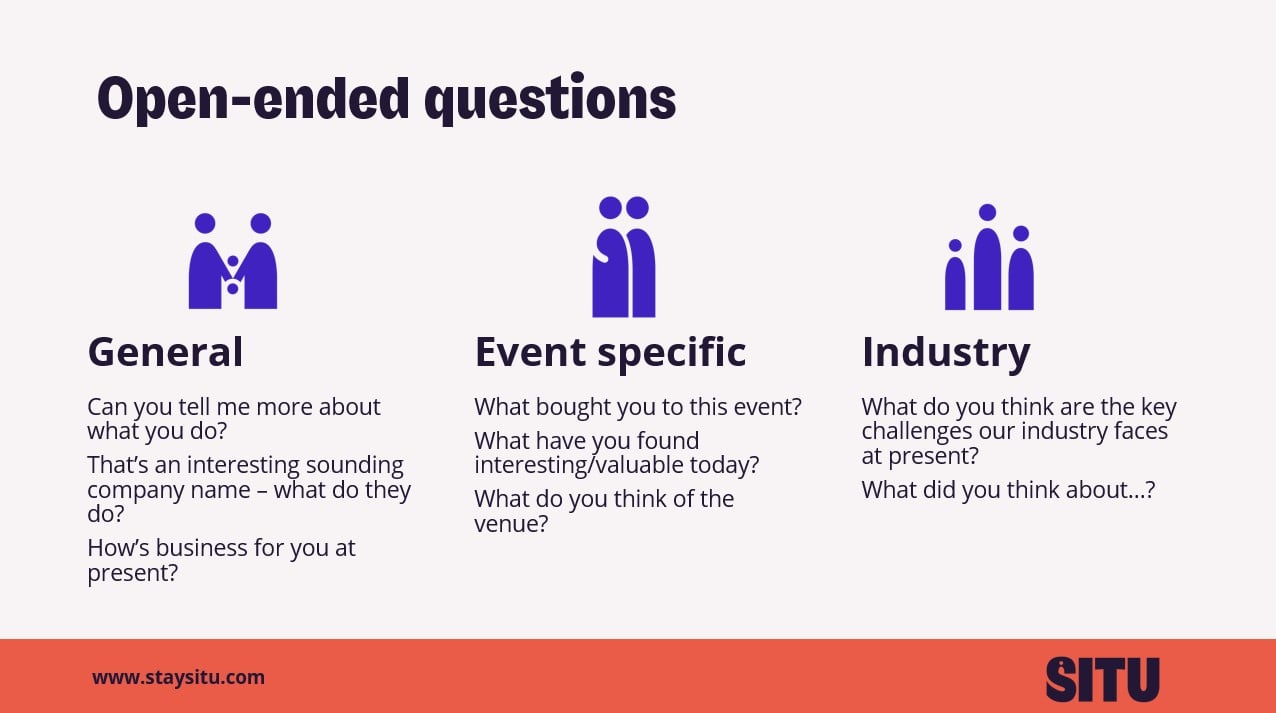
Top tips
- When the other person starts talking, the best response will always be, ‘that’s really interesting, please tell me more!’ Just remember to use it wisely.
- Remember to always listen more than you talk. This will ensure you’re presenting yourself in the best possible light.
- Steer the conversation in terms of the other person’s interests.
- Make the other person feel important, but do so sincerely.
- Smile!
Active listening
When conversing, ensure you’re actively listening to what the other person is saying. So, make sure you’re not trying to multi-task; i.e., looking at the door to see who’s coming in. Stay focused on the person you’re speaking to, using your face and body to convey that you’re listening; e.g., nodding, smiling, leaning forward, and presenting open body language.
A further key thing to remember is not to concentrate too hard on what you’re going to say after the person has finished speaking, as you’ll find yourself not fully paying attention to what’s being said in the moment.
Lastly, remember the ears and mouth ratio – meaning you have two ears and one mouth and you should respect that ratio (in simple terms, listen more than you talk)!
Elevator pitch
You’ve likely heard of an elevator pitch – this stems from the idea that you should be able to effectively put across who you are and what you do in the time it takes for an elevator ride to conclude. A lot of people worry about not knowing what to say for these quick intros, but luckily this is something you can practice beforehand.
The main points to hit are who you are, what you do, and who you work for. It is great if you can find something unique and interesting to say for the last point, this will ensure you and your company are remembered.
For instance, one could say, ‘My name is Bob, I’ve worked in Account Management for two years – currently as an Account Executive, and I work for Awesome Business, a company that has won awards for being a great place to work.’
This conveys who Bob is, a bit about his professional background, and provides an interesting fact about his definitely-not-made-up company, Awesome Business.
Feelings associated with networking and how they can be managed
Networking fears tend to stem from two common concerns: having no one to speak to and not knowing what to say. Thankfully, there are some steps you can take to mitigate these anxieties.
Small talk is a big help
One useful suggestion for easing conversation-related anxiety is being ‘ice-breaker and small talk ready’. This relates to having a series of questions and topics prepared in case an awkward silence rears its ugly head. Ideas range from how your conversation partner travelled to the event, discussing the venue, or there’s always weather chat – it’s a classic for a reason!
A further way of managing pre-networking anxiety is to have a clear goal or target in mind, this could be anything from speaking to a specific individual or leaving with three new connections. Just make sure they’re achievable – this will help you to manage expectations and leave with a feeling of success.
Don’t be a lonely lemon
If you find yourself going to an event alone, there are a few ways to get involved in conversation. For instance, you’ll likely be handed a name tag from a staff member – you can ask this person to introduce you to someone to get you started.
Or, you can research the event’s attendees and make contact with a few people beforehand. You can also initiate a conversation by complimenting someone’s outfit. Scary as it may seem, if you decide to approach a group of people and ask if you can join them at one of these events, it’s highly unlikely ‘no’ will ever be the response you receive.
Lastly, odds are you won’t be the only person attending on their own, scan the room and see if there’s anyone else standing alone, and if so, approach them and start chatting!
Awkward situations
A further concern that pops up is the fear you might get stuck in a conversation that you can’t escape. These situations can be awkward, so if you find yourself stuck, an easy way out is to say how lovely it has been chatting to the person, but that you need to speak to [insert name], or pop to the loo, etc. This will allow you to politely exit the conversation.
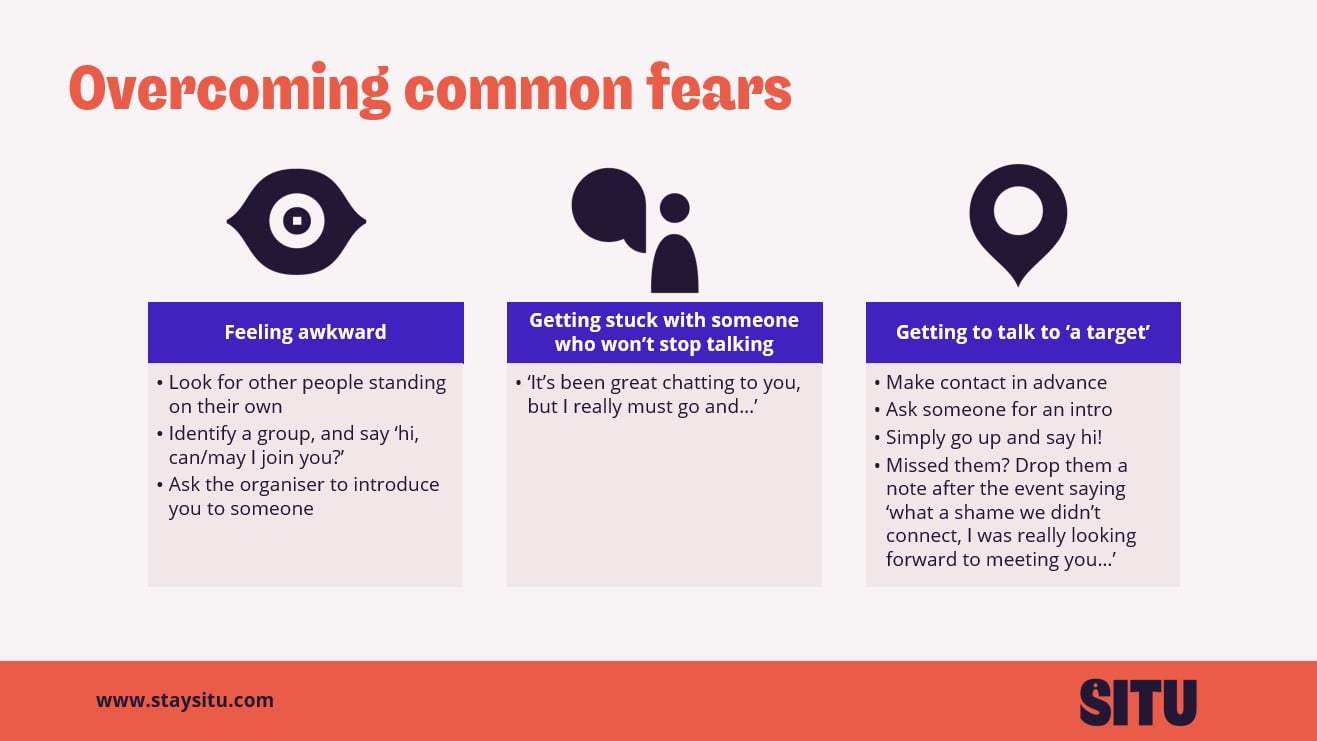
Post-networking things to remember
After networking, make notes, and always follow up! This can be with an email or a connection request on LinkedIn. Didn’t get to speak to the person you were eager to chat with? No worries, drop them a message expressing your disappointment at having missed them and go from there.
Hopefully these tips and suggestions have eased your mind – we’ve summarised the key points to remember in the image below.
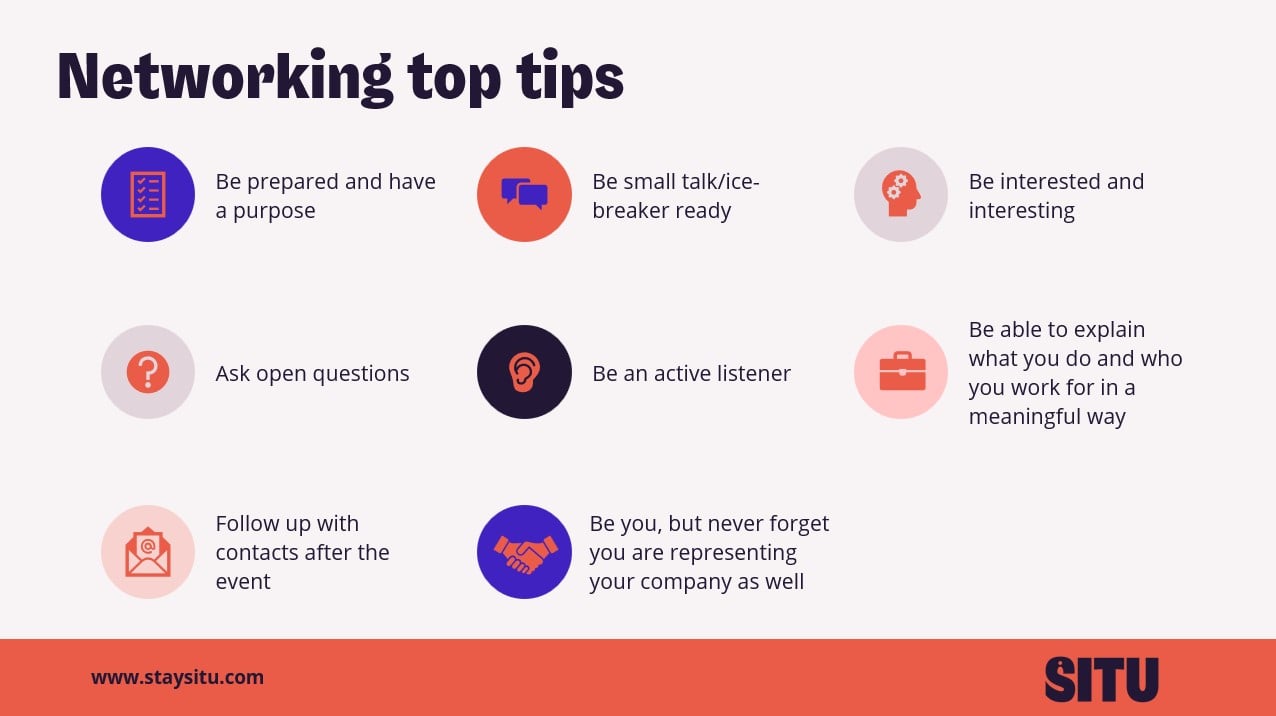
Online networking
Nowadays networking occurs online as well as in person. There are many social media platforms that are used to connect with others. For professional networking, the most commonly used platform is LinkedIn. In this environment you’ll find that your personal and business brand meet.
Building your personal brand
When building your personal brand, make sure that your profiles are current and interesting. You can also consider personalising your job title so that it better reflects your approach to your job role.
You also need to bear in mind whether you are talking about yourself or your business on your profile. If it’s your business, make sure you are reflecting the tone and brand voice that your company uses.
If you can, get someone else to review any posts you wish to publish, and make sure the content is something you would be happy to look back on in the future. Maybe take 24 hours to consider what you’re about to post so you’re sure it’s definitely suitable. Presentation is a further important consideration, include a relevant image if you’ve got one, make sure the wording is well spaced, and that your SPaG is correct.
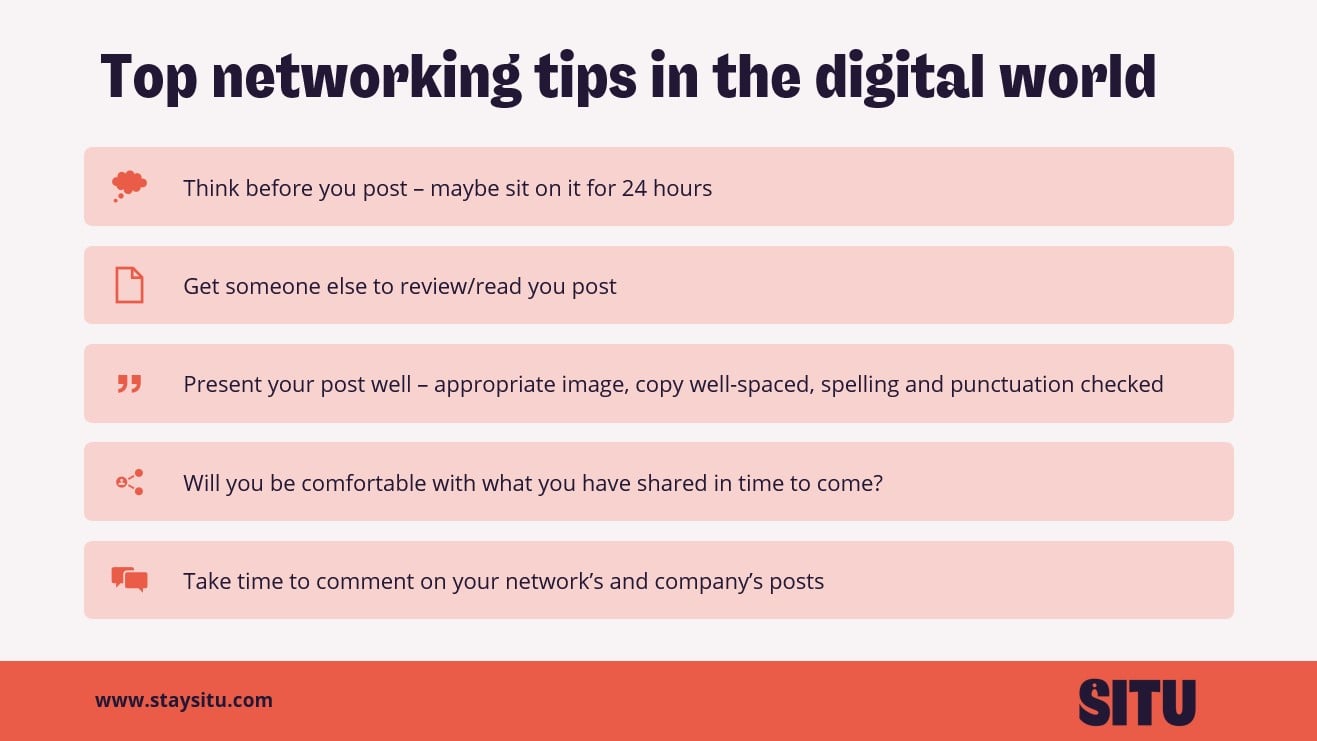
Conclusion
Networking is important, and knowing the best way to go about it will be greatly beneficial to your career. Daunting as it may seem at first, networking is a skill that can be improved over time. Remember to follow these essential tips and keep practising – you’ll get there!

